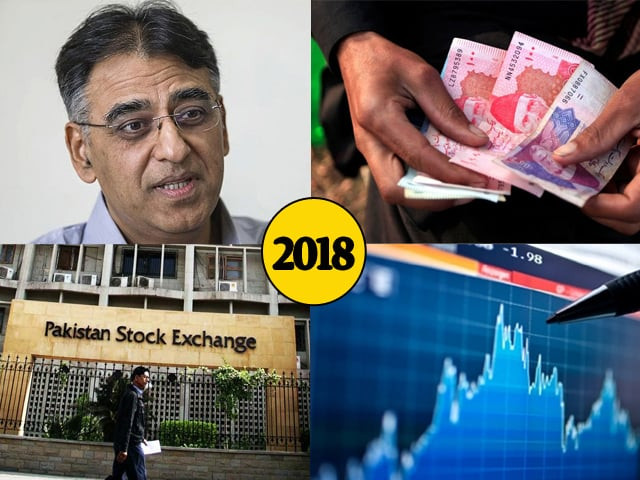In Pakistan, the financial year ends on June 30th. However, since the conventional year is about to end, we look back at how the new government fared at handling the economy and also make some policy prescriptions along the way.
The incumbent government is being judged rather harshly on its performance in the first few months. Let’s just make this clear: there is no silver bullet that could end Pakistan’s economic woes within 100 days. Given that the government has inherited a ‘broken’ economy, I’d say that they have performed quite well.
A common way to find out how well a country has performed is to look at its growth rate. The last fiscal year’s gross domestic product (GDP) growth rate was 5.8%, the highest in the last 13 years. That was fairly good.
Or so it seemed.
How was the economy broken?
The forecast for the next year seems to point out a plunge in our economy’s growth rate to 4.8%. And that is being blamed as the new government’s fault.
However, GDP growth rate could have been misleading in the first place. With our currency appreciated, our growth was driven by consumption. Households were overindulgent in their consumption of goods and services which consequently raised the GDP growth rate to 5.4%. But that also resulted in our import bill climbing to $55.8 billion. Our exports stayed at $24.8 billion and hard working Pakistanis working abroad sent their loved ones back home $19.6 billion in remittances.
When we import, we have to trade in dollars, even our foreign debt has to be paid in dollars. But since we weren’t earning as much in dollars either through exports or remittances, we started consuming our dollar reserves. We even borrowed more to finance the current account deficit which was 5.8% of the GDP, co-incidentally the same number as our GDP growth rate. The situation deteriorated even further when we were left with only two months import cover as of September 2018.
Moreover, the last government had spent more than it had earned. Government spending contributed around 1.7% to the GDP growth figure. Fiscal deficit climbed to 6.6% of the GDP, the highest in the last five years. One wonders how the government can spend more than it earns. Well, they borrow money!
The country was in deep crisis. Looking at this situation, the new government panicked about how to quell the dual deficits. Hence, we saw the government heroically sailing the ship in troubled waters and getting relief from friendly countries. Saudi Arabia bailed us out by providing a $6 billion package, China pledged their assistance and the same is expected from the UAE.
There are two ways of curbing the fiscal deficit: either increase the revenue or decrease expenditures. Public sector development programme was slashed from Rs1.6 trillion to Rs625 billion to decrease expenditures. Additional revenue measures of Rs183 billion were foreseen in the mini budget. The government envisioned containing the deficit to 5.1% of the GDP and so far it is doing a good job at it.
On the monetary side, the rupee had to be devalued. Our exports wouldn’t pick up with an artificially propped up rupee value and would only lead to an importing spree. The State Bank devalued the rupee in bouts of a rather sudden fashion, which sent shocks throughout the system. Hence, our imports subsided a little because of such measures such as regulatory duties and the devalued rupee.
Furthermore, low inflation and low interest rates kept private consumption high during the last year resulting in a high GDP growth. However, this government is faced with an ever rising inflation that might sky rocket to double digits. To keep this under control, the State Bank has increased interest rates. It looks like the government is taking all the necessary steps for economic stabilisation that are a precondition to the International Monetary Fund (IMF) bailout.
The investment drought
Investment remained low during the last financial year and it seems that it isn’t picking up this year either. Foreign direct investment has remained drastically low in this government’s time as well. This is unfortunate because real progress is only possible through increase in private investment. The government needs to try and jump-start the process.
To improve investments, particularly in the export industry, I would like to suggest some measures. There have been reports that the government is working on a new trade policy. The government should treat infant export industries with kid gloves. Firms should be given preferential treatment in the form of subsidies, credit and protection. But all of that should be contingent on performance. If they fail to acquire export orders, preferential treatment should be withdrawn. To insulate this measure from political and vested interests, giving and withdrawing preferential treatment to export industries should be directly managed from the prime minister office.
This can be seen when we compare Asian Tigers to Latin American/African countries. The former’s state did not bow down to political pressure to favour firms that weren’t performing. But the latter shielded their firms no matter what. South Korea’s Posco became the most efficient manufacturer of steel following this healthy competition encouraged by the government. Interestingly, the World Bank had advised the South Korean government against entering the steel sector because they did not have a comparative advantage. But the tables turned for them. Giving subsidies and protection to firms without ensuring that they are competing would only make them lazy.
In Pakistan, we should concentrate on our clothing industry because we already have the existing backward linkages to support it. There is no need to start from scratch as we have cotton fields, yarn spinners and a thriving textile industry. Moreover, we also have budding designers who can act as forward linkage and earn foreign exchange for us. Meanwhile, we can explore other sectors such as pharmaceuticals, fisheries and food industry to make them internationally competitive based on contingent preferential mechanism.
Another suggestion I would like to make is to withdraw untargeted subsidies, such as on energy, and funnel those funds to cash transfers such as the Benazir Income Support Programme (BISP). Any inflationary pressure due to the removal of subsidies would be offset by cash that the underprivileged would receive as a safety net. This way a lot of unwanted subsidy that is wasted on the affluent would be siphoned off to where it is needed the most. However, there should be a set criteria for the cash transfers people receive from BISP. For example, the family receiving the cash would have to send their children to school otherwise these cash transfers would stop. This would motivate these people to send their children to school and may help the country’s literacy rate.
To cure cancer, chemotherapy, radiography and sometimes surgery is required, which leaves the patient incapacitated for quite some time. But the patient thanks the doctors later because all that additional pain made him healthier. Our economy is cancer ridden and to correct it, we have to suffer initial blows. Hundred days are not enough to gauge the performance of a government. And so far, the government has rightly taken all the tough decisions. I wish the present administration best wishes and really hope they put Pakistan on the path to prosperity.
Pakistan’s economy: Rising through the storms
Given that the government has inherited a ‘broken’ economy, I’d say that they have performed quite well.

Investment remained low during the last financial year and it seems that it isn’t picking up this year either.


COMMENTS
Comments are moderated and generally will be posted if they are on-topic and not abusive.
For more information, please see our Comments FAQ